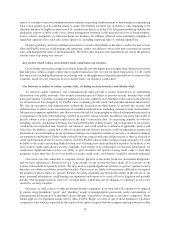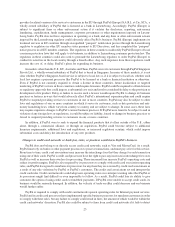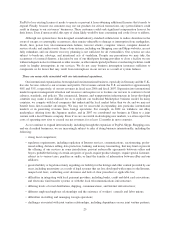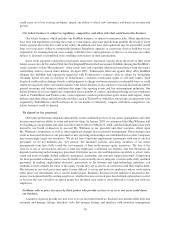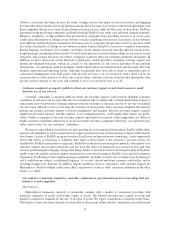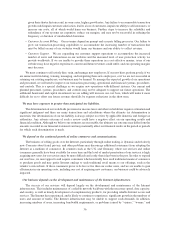eBay 2007 Annual Report Download - page 36
Download and view the complete annual report
Please find page 36 of the 2007 eBay annual report below. You can navigate through the pages in the report by either clicking on the pages listed below, or by using the keyword search tool below to find specific information within the annual report.• difficulties in implementing and maintaining adequate internal controls;
• longer payment cycles, different accounting practices, and greater problems in collecting accounts
receivable;
• potentially adverse tax consequences, including local taxation of our fees or of transactions on our websites;
• higher telecommunications and Internet service provider costs;
• different and more stringent user protection, data protection, privacy and other laws;
• cultural ambivalence towards, or non-acceptance of, online trading;
• seasonal reductions in business activity;
• expenses associated with localizing our products, including offering customers the ability to transact
business in the local currency;
• laws and business practices that favor local competitors or prohibit foreign ownership of certain businesses;
• profit repatriation restrictions, foreign currency exchange restrictions, and exchange rate fluctuations;
• volatility in a specific country’s or region’s political, economic or military conditions; and
• differing intellectual property laws.
Some of these factors may cause our international costs of doing business to exceed our comparable domestic
costs. As we expand our international operations and have additional portions of our international revenues
denominated in foreign currencies, we also could become subject to increased difficulties in collecting accounts
receivable, repatriating money without adverse tax consequences, and risks relating to foreign currency exchange
rate fluctuations. The impact of currency exchange rate fluctuations is discussed in more detail under “We are
exposed to fluctuations in currency exchange rates and interest rates,” above.
In addition, we conduct certain functions, including product development, customer support and other
operations, in regions outside the U.S., particularly in India and China. We are subject to both U.S. and local
laws and regulations applicable to our offshore activities, and any factors which reduce the anticipated benefits,
including cost efficiencies and productivity improvements, associated with providing these functions outside of the
U.S. could adversely affect our business.
We are continuing to expand PayPal’s services internationally. In some countries, expansion of PayPal’s
business may require a close commercial relationship with one or more local banks, a shared ownership interest
with a local entity or registration as a bank under local law. Such requirements may reduce our profitability or limit
the scope of our activities in particular countries. Any limitation on our ability to expand PayPal internationally
could harm our business.
We maintain a portion of Shopping.com’s research and development facilities and personnel in Israel, and in
January 2008 we acquired Fraud Sciences Ltd., an Israeli company. As a result, political, economic and military
conditions in Israel affect those operations. The future of peace efforts between Israel and its neighboring countries
remains uncertain. Increased hostilities or terrorism within Israel or armed hostilities between Israel and neigh-
boring states could make it more difficult for us to continue our operations in Israel, which could increase our costs.
In addition, many of our employees in Israel could be required to serve in the military for extended periods of time
under emergency circumstances. Our Israeli operations could be disrupted by the absence of employees due to
military service, which could adversely affect our business.
Acquisitions and joint ventures could result in operating difficulties, dilution, and other harmful
consequences.
We have acquired a number of businesses in the past, including, most recently, Fraud Sciences Ltd. and
StumbleUpon. We expect to continue to evaluate and consider a wide array of potential strategic transactions,
including business combinations, acquisitions and dispositions of businesses, technologies, services, products and
other assets. At any given time we may be engaged in discussions or negotiations with respect to one or more of
26





